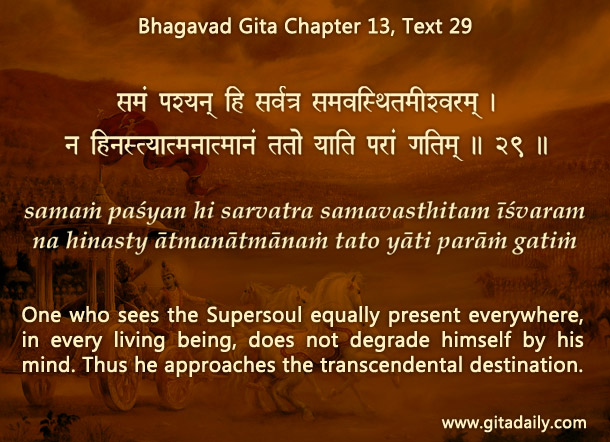Suppose we are in a disturbed frame of mind and are driving to a meeting. Our map tells us that we have reached our destination, but we can’t see the meeting venue anywhere. Despair starts overpowering us.
Somehow, we get the idea to close our eyes, breathe deeply and pray. When we open our eyes, we find the venue right in front of us. We had passed it several times, but hadn’t noticed it because of our agitated mind.
Thus, the mind can blind us to that which is visible. Just imagine, then, how much it can blind us to that which is invisible, to that which needs to be inferred based on the visible. Such is the spiritual realm.
The Bhagavad-gita (13.29) states that those who see all living beings with equal vision avoid getting degraded by the mind and rise to the supreme destination. Vision here refers to the knowledge that helps us make sense of what we see, to see that which is not immediately visible.
The Gita’s philosophical vision helps us see all living beings as essentially spiritual, as souls who are parts of the one same God whom we too are parts of. Like us, they too are troubled by their mind. Impelled by their mind, they may do things that trouble us. If we react based on our mind’s shortsighted impulses, we simply aggravate the trouble. Instead, if we strive to calm our mind by praying to Krishna and seeking his guidance, we gradually realize that the proper response was right in front of us; we had been blinded to it by our agitated mind.
By thus understanding how the mind can blind us, we can train ourselves to see with the philosophical vision that shows us what we need to see.
To know more about this verse, please click on the image
Explanation of article:
Podcast:


HK Prabhuji,
The Gita Daily articles and lectures that you are posting are really helpful in my spiritual development. It specially help those who like me are housewives and want to study more .I specially like your B.G.9.26 article.
Your Servant
Sita Thakurani dd
ISKCON NOIDA
Thank you for your kind words – happy to know that I am of service to you.